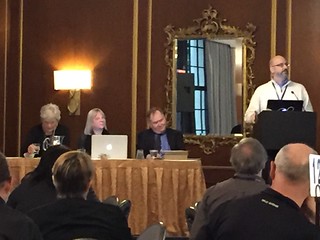
Moderator: Seamus Ross
Panelists: David Lankes, Wendy Newman, and Twyla Gibson
The Ethics and Values of Our Profession
How do we know that our students have grasped the ethics and values that are important to us and our profession?
Gibson - How do people learn ethics? She began by quoting Plato.
In the western tradition there are three frameworks for ethics: virtue ethics (and professional ethics), deontology, and consequentialism. Deontology is "ethics, especially that branch dealing with duty, moral obligation, and right action." She believes that ethics can be learned and taught. They can learned through examples and modeling.
Newman - Values are the connective tissue in our schools. How do students understand values and ethics? People tend to choose LIS because it aligns with their values. What are the barriers to those students then acting ethically or exerting their values? Students may have insecurity to their own leadership role and capacity. They may then not see themselves to exert ethics and values. Students may use conflict avoidance.
What should we do as instructors to help them understand the values and use them? We can use assignments and group work to help students understand their values, be able to discuss them, and learn how to navigate conflict. We can use guest speakers to help students see how values play out in the workplace. Finally, for their entire lives, students are part of a profession that has values and which can mentor students with their values.
Lankes - Ethics are alive. Our profession and our culture has changed. Our communities have changed norms, which have then impacted our profession. Our students are stewards of our principles and values. They need to be ethicists and not just ethical. They need to be able to talk about values like privacy and security, and other current issues. We as faculty need to provide platforms for large scale social actions for our students, but doing it in a way that does not threaten the future of the students. We need to provide an intellectually safe place for this exploration.
Our table question was: How do we help students to understand the distinction between personal values and professional values?
Students need to be exposed to ethics across a number of courses and also learn how to apply it in their work. Some students may be working in libraries already and can bring in their own practical experiences. Students also need to learn how to create policies - ethical policies (moral principles and codes of conduct).
Summary from our table:
- Ethics may depend on context and policy
- Ethics needs to be integrated into all courses
- We need to be reflective practitioners
- Students can learn from one another
Notes from some of the other tables:
- Many of our students are conflict avoidance
- Students need to assert self-authority
- Teach them how not to treat ethics as a "cookbook"
- There is some ambiguity in how we think about ethics
- Teach through the use of video clips
- The context of business and medical context around ethics
- Use classic debate techniques, where students are assigned a side or point of view to defend
- We assume that we do talk about ethics in our classes
- Need to teach how to negotiate conflicting values
No comments:
Post a Comment